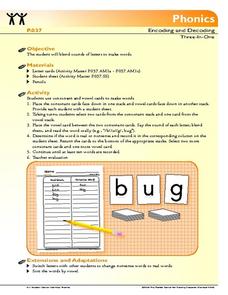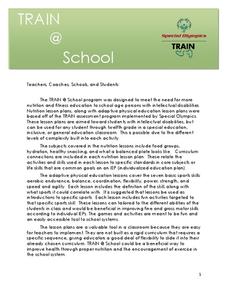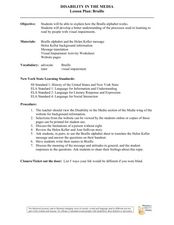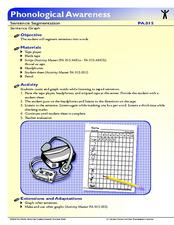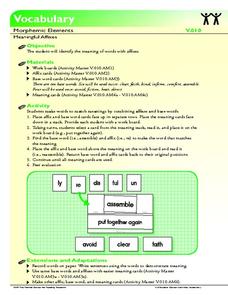Newseum
The Medium Shapes the Message
Where do you get your news? Have learners examine four different publications and decide which one they would choose to read on their own time. The resource includes a list of publication types to supply and a worksheet for groups to...
Brown University
Following the U.S. Presidential Election
Election years provide the opportunity to evaluate news media as well as the next prospective president. High schoolers read about the same event in several different news sources, varying in type, origin, and political leaning, before...
Florida Center for Reading Research
Phonics: Encoding and Decoding, Three-In-One
Scholars use the provided pack of alphabet cards to construct basic CVC words, then write down each word they make in one of two columns. Column one is for real words and column two is for nonsense words.
Florida Center for Reading Research
Phonics: High Frequency Words, Sand Paper Words
Learners use a stack of words embellished with tactile elements, such as sandpaper, to practice high-frequency words. Pupils trace the tactile surface of each letter in the word, write it on their paper, then find and glue that word from...
Albert Shanker Institute
Dream Under Development
As part of their study of the 1963 March on Washington, class members do a side-by-side comparison of the original text of Martin Luther King's "I Have a Dream Speech" with a transcript of the speech he delivered. The take away from the...
Curated OER
Valuing Different Views: Taking a Stand on Media Violence
Students recognize the value of multiple perspectives and differences of opinion. They build empathy and open-mindedness for other points of view. They study the complexity of social and cultural issues such as violence in media.
Special Olympics
Train at School
Keep your mind and body fit with a fun activity about the five food groups. After going over the functions of fruit, vegetables, grains, meats and beans, and dairy, as well as oils and fats, learners participate in a bean bag toss to...
Appalachian State University
The Fault in Our Stars: A Movie Study Guide for Eighth Grade Language Arts, Social Studies, and Science
How would you spend your last days with a loved one? The movie guide for The Fault in Our Stars prompts scholars to compare important scenes from the novel to the film and contains background information about the author, guided...
Curated OER
Disability in the Media Lesson Plan: Braille
Students determine the workings of the Braille alphabet and how people with visual impairments learn how to use it. In this Braille lesson, students study the associated vocabulary, read about Helen Keller, and complete associated...
Florida Center for Reading Research
Phonological Awareness: Syllables, Clapping Names
Scholars practice identifying and counting syllables. Images of classmates are cut out and placed on a chart. Learners clap and count the syllables in each child's name. They finish by writing the number of syllables under the...
Florida Center for Reading Research
Vocabulary: Word Meaning, All For One
Given a deck of cards with different words printed, pairs draw cards and work together to locate definitions for each multiple-meaning word. Learners complete a worksheet that challenges them to write the word, two of its definitions,...
PBS
Stories of Painkiller Addiction: Prescription Drug Abuse Awareness Campaign
The I-STOP law was designed to regulate the distribution and tracking of prescription drugs. After reading an article about its signing and implementation, middle and high schoolers work together to come up with their own ideas for an...
Melissa Institute for Violence Prevention and Treatment
Concept Muraling
Concept muraling helps learners improve their comprehension of a text by giving them a way to organize their understanding of the key concepts in that text. Introduce readers to this process with a carefully scaffolded lesson that models...
Florida Center for Reading Research
Vocabulary: Morphemic Elements, Rooting for Meaning!
Scholars work with root and meaning cards to build vocabulary skills. Playing with a partner, learners read a root, locate its meaning, and cover it with a counter. The first player to cover their board wins.
Florida Center for Reading Research
Phonological Awareness: Phoneme Segmenting and Blending, Picture Slide
A hands-on activity challenges young scholars to name a picture, segment its phonemes, then blend those sounds to make the word.
Florida Center for Reading Research
Phonological Awareness: Sentence Segmentation, Sentence Graph
Young scholars segment sentences while they listen to a series of sentences. Using a graph, pupils make a mark for each word they hear. Learners listen to each sentence three times; once to listen, once to mark, and once to check their...
Florida Center for Reading Research
Phonemic Awareness: Phoneme Segmenting, The Phoneme Game
Early readers play a board game to practice segmenting phonemes. Players determine how many spaces to move by choosing a picture, saying the object's name on the card, then counting the phonemes they say.
Florida Center for Reading Research
Vocabulary: Morphemic Elements, Meaningful Affixes
Invite learners to determine which affix and base word combinations create new words. This activity allows pupils to play around and create words that match specific meanings.
Florida Center for Reading Research
Vocabulary: Word Meaning, Oh My Word!
Ever come across an unfamiliar word while reading and can't decipher its meaning? Use a worksheet and graphic organizer that tracks and helps bring meaning to unknown words as learners read a text. A worksheet and graphic organizer come...
Howard Hughes Medical Institute
Gorongosa: Scientific Inquiry and Data Analysis
How does the scientific process begin? Introduce ecology scholars to scientific inquiry through an insightful, data-driven lesson. Partners examine data from an ongoing research study to determine the questions it answers. The resource...
Florida Center for Reading Research
Phonological Awareness: Phoneme Matching, Sound Maker - Sound Smacker
Scholars sort words based on their initial phonemes. They choose cards, say their names, and match the initial phoneme to the one posted on one of the sorting bins. If the initial sound matches, they put the card in the sound maker bin,...
Curated OER
Pre-Reading Preparation
Students research the English Renaissance era. In this research lesson, students complete this activity before reading the story The Prince and the Pauper to learn about the history. They pick topics and work in groups to research them.
Curated OER
Home Living/ Daily Living: Food Pyramid
What did you have for lunch? Did it contain all four food groups? Help your special education class make good food choices and recognize foods in each of the four food groups. They look at images and discuss the foods on the food pyramid...
Reading for Meaning
Sample Lessons and Worksheets
If you need to bulk up your reading comprehension worksheet collection, take a look at a resource that includes graphic organizers and reading comprehension questions. The series of 50 worksheets addresses novels such as Julie of the...




